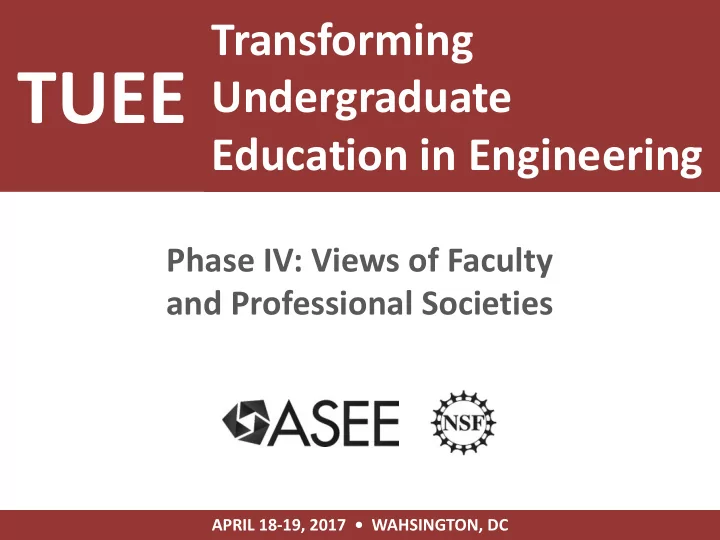

Transforming TUEE Undergraduate Education in Engineering Phase IV: Views of Faculty and Professional Societies APRIL 18- 19, 2017 • WAHSINGTON, DC
Session 2: Delphi Part 3 1. Discuss and compare/contrast to Industry KSAs (competencies). – Note key differences and similarities – suggestions to integrate the two 2. Discuss, revise, refine overall competency map 3. Discuss, refine, refine KSAs included in specific competencies.
Session 2: Final Refinement • 1.) Delphi vs TUEE I and II comparison (45 min) • 2.) Overall Competency Map review (30 min) • 3.) Refine KSAs (45 min)
Phase I and II 1.0 Professional Competence & TUEE Program Table 2, pg 18 1.3 Interpersonal 1.1 Intrapersonal 1.2 Engineering Competence Competence Competence 1.1.1 Self-Directed, 1.2.1 Technical, 1.3.1 Communication Lifelong Learning Analytical 1.1.2 Intellectual, 1.3.2 Teamwork 1.2.2 Scientific Innovative, Critical Thinking 1.3.3 Leadership, 1.2.3 Mathematical Project Management 1.1.3 Ethical 1.3.4 Social, 1.2.4 Innovative, Intercultural Creative, Design 1.1.4 Thinking Conscientiousness OVERALL COMPETENCY MAP Working Draft 16 April 2017
Session 2 - 1 Differences Similarities 4 - 7 4 - 7 Integration Suggestions 1 - 2
Session 2 Part 2 1.0 Professional Competence 1.3 Interpersonal 1.1 Intrapersonal 1.2 Engineering Competence Competence Competence 1.1.1 Self- 1.3.1 1.2.1 Technical, Directed, Lifelong Communication Analytical Learning 1.1.2 Intellectual, 1.3.2 Teamwork 1.2.2 Scientific Innovative, Critical Thinking 1.3.3 Leadership, 1.2.3 Project 1.1.3 Ethical Mathematical Management 1.2.4 Innovative, 1.3.4 Social, Intercultural Creative, Design 1.1.4 Thinking Conscientiousness OVERALL COMPETENCY MAP Working Draft 16 April 2017
Session 2 - 2
Session 2 Part 3 KSAs of Intrapersonal Competencies Working Draft 16 April 2017 1.1 Intrapersonal K-- Knowing how to learn and where to find resources; Understanding lifelong learning; Competence S-- Doing self-assessment, management, development; Practicing life-long learning A — Curious; Motivated; Pro-active; High achiever; Introspective; 1.1.1 Self-Directed, Lifelong Learning K — Knowing/understanding other disciplines (beyond STEM); Multi-literate; Understand 1.1.2 Intellectual, problem solving; Comprehending value of diversity; Innovative, Critical S — Adept problem finder/manager/solver; Making informed/good decisions; Apply knowledge; Deal with ambiguity/conflict/plurality; Make inferences/judgments Thinking A — Innovative; Creative; Insightful; Open-minded; Resourceful; Growth/entrep. mindset 1.1.3 Ethical K-- Understand what constitutes ethical/moral behavior and professional responsibility; Understand civic responsibility; S — Accept responsibility; Act with empathy; Respect others; Consider broad contexts; Make informed, equitable, inclusive judgments; Embrace diversity, inclusion 1.1.4 A — Honest; Having high integrity/EQ; Reliable; Dependable; Concern for positive impact; Conscientiousness K — Understanding value of stakeholders/needs; Understand professional standards/constraints; Understanding personal attributes/capabilities S — Acts professionally, with integrity and high standards; Critique self; Manage time, priorities, risks, motivations, integrity, learning; Develop mastery; A — Reflective; Responsible; Self-aware; Persistent; Humble; Motivated; Careful; Punctual
Definitions Merriam-Webster.com “Can do” competencies Knowledge — acquaintance with or knowing/understanding something (See cognitive taxonomies) Skills — ability to use one’s knowledge effectively, especially in the performance of a task (See psychomotor skills taxonomies) “Will do” competencies Attitude — a feeling or emotion toward something (See affective taxonomies)
Session 2 - 3
Session 2 Part 3 KSAs of Intrapersonal Competencies Working Draft 16 April 2017 1.1 Intrapersonal K-- Knowing how to learn and where to find resources; Understanding lifelong learning; Competence S-- Doing self-assessment, management, development; Practicing life-long learning A — Curious; Motivated; Pro-active; High achiever; Introspective; 1.1.1 Self-Directed, Lifelong Learning K — Knowing/understanding other disciplines (beyond STEM); Multi-literate; Understand 1.1.2 Intellectual, problem solving; Comprehending value of diversity; Innovative, Critical S — Adept problem finder/manager/solver; Making informed/good decisions; Apply knowledge; Deal with ambiguity/conflict/plurality; Make inferences/judgments Thinking A — Innovative; Creative; Insightful; Open-minded; Resourceful; Growth/entrep. mindset 1.1.3 Ethical K-- Understand what constitutes ethical/moral behavior and professional responsibility; Understand civic responsibility; S — Accept responsibility; Act with empathy; Respect others; Consider broad contexts; Make informed, equitable, inclusive judgments; Embrace diversity, inclusion 1.1.4 A — Honest; Having high integrity/EQ; Reliable; Dependable; Concern for positive impact; Conscientiousness K — Understanding value of stakeholders/needs; Understand professional standards/constraints; Understanding personal attributes/capabilities S — Acts professionally, with integrity and high standards; Critique self; Manage time, priorities, risks, motivations, integrity, learning; Develop mastery; A — Reflective; Responsible; Self-aware; Persistent; Humble; Motivated; Careful; Punctual
Recommend
More recommend